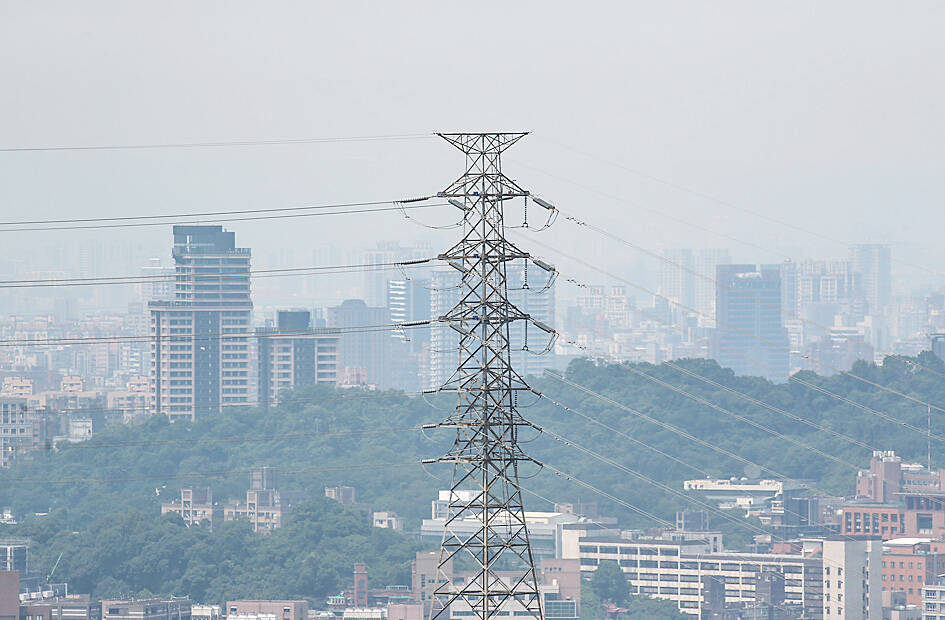Taiwan Power Co (Taipower, 台電) plans to keep electricity rates unchanged for the next six months for households and industrial customers, as the state-run utility aims to tame surging inflation and help the public navigate rising living costs.
The average power rate remains at NT$2.8458 per kilowatt-hour (kWh) after price increases in July.
The Ministry of Economic Affairs made the announcement after concluding an electricity price review committee meeting yesterday.

Photo: CNA
The decision also represented a positive response to calls from major business groups for steady electricity pricing. Businesses said a 15 percent hike in July was a major hit to local manufacturers.
The committee yesterday also said that it would expand the summer power rate period by one month to Oct 15, targeting high-voltage power users, usually industrial customers. About 25,000 users are to be affected, the ministry said.
The adjustment is a response to longer periods of high temperatures due to a warming climate that require a measure to stabilize power supply in the fall, the ministry said.
Taipower usually shuts a coal-fired generator in October to reduce carbon emissions, as air pollution tends to increase with the arrival of autumn. The designated plant has an installed capacity of 2.7 million kilowatt, it said.
In a supporting measure to this adjustment, Taipower said it would reduce electricity rates for lower-temperature seasons to keep each year’s power rates flat for industrial users.
The new pricing mechanism for industrial users is to take effect next year.
The new price scheme should reduce peak-hour power consumption by about 500 megawatt, equal to the installed capacity of a power unit at Taichung Power Plant (台中電廠), Taipower said.
The July rate hikes have raised Taipower’s revenue by about NT$28.8 billion (US$918.7 million), the ministry said.
Taipower has accumulated NT$123.2 billion in losses during the first 7 months of this year. The company expects the losses to widen in the remaining period of this year, given high energy costs.
Taipower continues to face high energy costs as global coal prices remain at historical highs ranging from US$400 to US$450 per tonne, the ministry said.
The prices of crude oil and natural gas pulled back slightly from peak levels, as economic slowdowns worldwide curtailed energy consumption, the ministry added.
The electricity price review committee is to meet again in March next year.

Three experts in the high technology industry have said that US President Donald Trump’s pledge to impose higher tariffs on Taiwanese semiconductors is part of an effort to force Taiwan Semiconductor Manufacturing Co (TSMC, 台積電) to the negotiating table. In a speech to Republicans on Jan. 27, Trump said he intends to impose tariffs on Taiwan to bring chip production to the US. “The incentive is going to be they’re not going to want to pay a 25, 50 or even a 100 percent tax,” he said. Darson Chiu (邱達生), an economics professor at Taichung-based Tunghai University and director-general of

‘LEGACY CHIPS’: Chinese companies have dramatically increased mature chip production capacity, but the West’s drive for secure supply chains offers a lifeline for Taiwan When Powerchip Technology Corp (力晶科技) entered a deal with the eastern Chinese city of Hefei in 2015 to set up a new chip foundry, it hoped the move would help provide better access to the promising Chinese market. However, nine years later, that Chinese foundry, Nexchip Semiconductor Corp (合晶集成), has become one of its biggest rivals in the legacy chip space, leveraging steep discounts after Beijing’s localization call forced Powerchip to give up the once-lucrative business making integrated circuits for Chinese flat panels. Nexchip is among Chinese foundries quickly winning market share in the crucial US$56.3 billion industry of so-called legacy

Taiwan Semiconductor Manufacturing Co (TSMC, 台積電) yesterday held its first board of directors meeting in the US, at which it did not unveil any new US investments despite mounting tariff threats from US President Donald Trump. Trump has threatened to impose 100 percent tariffs on Taiwan-made chips, prompting market speculation that TSMC might consider boosting its chip capacity in the US or ramping up production of advanced chips such as those using a 2-nanometer technology process at its Arizona fabs ahead of schedule. Speculation also swirled that the chipmaker might consider building its own advanced packaging capacity in the US as part

A move by US President Donald Trump to slap a 25 percent tariff on all steel imports is expected to place Taiwan-made steel, which already has a 25 percent tariff, on an equal footing, the Taiwan Steel & Iron Industries Association said yesterday. Speaking with CNA, association chairman Hwang Chien-chih (黃建智) said such an equal footing is expected to boost Taiwan’s competitive edge against other countries in the US market, describing the tariffs as "positive" for Taiwanese steel exporters. On Monday, Trump signed two executive orders imposing the new metal tariffs on imported steel and aluminum with no exceptions and exemptions, effective